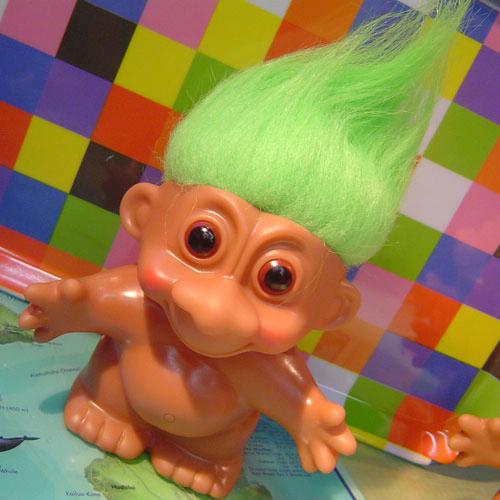"Or two identical onions? But you can peel them, layer after layer, down to the centre, down t the juicy quick, and, just as you tear into that, and the last bit of onion-juice stains your fingers, they resemble each other-- enough." pg 105
When I first read this, I thought, "Ah, I guess we are not all exactly the same soul-wise, but we are similar in nature, but we are all shrouded in the same kind of complex layers." And then I thought of Shrek, especially as Ibsen's portions of the Biographer's Tale are peppered with troll references. (I guess trolls are similar to ogres, but they tend to be more aggressive and territorial- says Wikipedia and fairy tales). I think both points- onions and trolls- have something to do with how Ibsen lives as a scientist/ observer.
Onions testify to Ibsen's more scientific nature. He wants to observe every aspect of human nature, but so much occurs internally. He can't watch the brain and the soul at work. He needs to peel the physical layers away to peer "doubtless into the cavern of the skull. The scalp and the features were rolled back like the skin of an onion" (170). On that level, people are not what we think are people. Instead they are simply objects (things, I guess), which Ibsen can break open to see the source of imagination and thinking. "SP: But, my dear sir, consider. It's to your advantage. I'll open you up and let in the light. I want to discover the source of your dreams. I want to find out how you're put together. pg 176." I'm not sure Ibsen is truly thinking of breaking human skulls apart (or waiting for them to fall apart) in order to have a looksy into the mind, but he does mean to delve deeper to go beyond the "Stranger on a Train" acquaintance with his characters. He has to piece together their psyches with as much precision and care as a clockmaker, which means he has to fully comprehend each part and how it functions (very scientific of him).
But then comes in the trolls. I think it is interesting that he incorporates the fairytale myth of the troll, because he sees the troll in himself. I looked up "troll" at http://www.mythicalcreaturesguide.com and got this definition: A troll is a fearsome member of a mythical anthropomorph race from Scandinavia, mostly Norway. Their role ranges from fiendish giants – similar to the ogres of England – to a devious, more human-like folk of the wilderness, living underground in hills, caves or mounds.depending on the type of troll (forest or mountain), the forest sometimes likes to hide or hybernate in deep springs or rivers. The mountain troll mostly likes to house in mounds or hills.
The way Ibsen talks about trolls in the BT makes me wonder why he sees the creature in his soul as well as in his face. "To live is to war with trolls in heart and soul" (94). I'm just not sure what he means by this. In some ways, he keeps his troll hidden from the world and only brings him out to write, to order/scientifically observe and dissect the people around him. It implies a deviousness in his methodical procedures. Later on in the chapter though, he talks about how he always keeps his troll hidden, to "keep it locked up inside, and that is why we sometimes seem to stand as if we were observing each other at a distance" (101). So, maybe he lets his inner troll, the impish aspect of his soul, control how he portrays his scientific observations, but he doesn't want anyone to know it is there, giving the subject the illusion that he is cold and detached?
He is tricky.


No comments:
Post a Comment